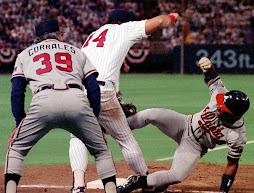::::::::following from www.wired.com::::::::::
1897: Karl Elsener legally registers his "soldiers' knife" for use by the Swiss army.
In an age when nationalism was fashionable, Elsener, a Swiss manufacturer of surgical instruments and cutlery, was a very fashionable man indeed. So he was less than thrilled to learn that the Swiss army was importing Solingen blades from neighboring Germany. Elsener set out to develop a homegrown multifunctional tool worthy of being carried by his local Alpine troops.
His prototype of what became known as the Swiss army knife appeared in 1891. The original -- made with a wooden handle -- included a blade, a screwdriver and a can opener. But Elsener was not happy with it and tinkered endlessly, adding a second blade using a revolutionary spring mechanism, and strengthening the housing.
The addition of a second blade necessitated extra space for the spring, which also opened up more room for other tools.
Elsener created a company, which he named Victoria after his mother, and opened a cutlery factory in Ibach, at the foot of the Alps.
After switching to stainless steel blades in 1921, the company -- which remains a family-run concern to this day -- was renamed Victorinox, "inox" truncated from the French word inoxydable for stainless. Today, in addition to its signature army knife, the company manufactures other precision instruments, especially watches.
The classic Swiss army knife bears the Swiss national symbol, a white cross in the center of a red shield, outlined in white against the red handle.
More than 34,000 Swiss Army knives are manufactured every day, and small wonder. This remarkably versatile tool is standard equipment for everyone from Boy Scouts to building contractors to mountaineers. It is even carried into space aboard the space shuttle.
Oh, and every recruit in the Swiss army still receives a knife upon entering the service. Victorinox supplies the army with about 50,000 knives each year.
Many variations are available, from relatively simple to jaw-droppingly complex.
The SwissChamp model, for example, which sells for around 88 bucks, boasts (take a deep breath): a large blade, small blade, can opener with small screwdriver, bottle opener with large screwdriver and wire stripper, scissors, pliers with wire cutter, wood saw, fish scaler with hook disgorger and ruler, metal saw with metal file and nail file, magnifying glass, reamer with sewing eye, Phillips screwdriver, corkscrew, hook, wood chisel, fine screwdriver, mini-screwdriver, ballpoint pen, straight pin, tweezers, key ring and … a toothpick.
A commemorative knife known as The Giant (it's 9 inches thick), contains 85 devices allowing for 110 functions. It's yours for around $1,200.
Other models reflect advances in technology and include features such as a laser pointer, USB flash drive and even an MP3 player.
Source: Victorinox, eWebtechnologies.com
:::::::::following from Wikipedia:::::::::
Some of the Notable Events Today, June 12, in History
1418 - An insurrection delivers Paris to the Burgundians.
1429 - Hundred Years' War: Joan of Arc leads the French army in their capture of the city and the English commander, William de la Pole, 1st Duke of Suffolk in the second day of the Battle of Jargeau.
1560 - Battle of Okehazama: Oda Nobunaga defeats Imagawa Yoshimoto.
1665 - England installs a municipal government in New York City. This was the former Dutch settlement of New Amsterdam.
1775 - American Revolution: British general Thomas Gage declares martial law in Massachusetts. The British offered a pardon to all colonists who lay down their arms. There would be only two exceptions to the amnesty: Samuel Adams and John Hancock, if captured, were to be hanged.
1830 - Beginning of the French colonization of Algeria: 34,000 French soldiers landed 27 kilometers west of Algiers, at Sidi Ferruch.
1864 - American Civil War Overland Campaign: Battle of Cold Harbor - Ulysses S. Grant gives the Confederate forces under Robert E. Lee a victory when he pulls his Union troops from their positions at Cold Harbor, Virginia and moves south.
1898 - Philippine Declaration of Independence: General Emilio Aguinaldo declares the Philippines' independence from Spain.
1899 - New Richmond Tornado: 8th deadliest tornado in U.S. history - killing 117 and injuring around 200 people.
1902 - Australia: Women in the four Australian States without female suffrage achieved the right to vote in Commonwealth elections under Section 3 of the Commonwealth Franchise Act for a Uniform Federal Franchise. Specifically excluded from enrolling to vote were 'aboriginal native[s] of Australia Africa Asia or the Islands of the Pacific except New Zealand' unless covered under Section 41 of the Constitution of Australia.
1922 - In Windsor Castle, King George V receives the colours of the six Irish regiments that are to be disbanded - the Royal Irish Regiment, the Connaught Rangers, the South Irish Horse, the Prince of Wales's Leinster Regiment, the Royal Munster Fusiliers and the Royal Dublin Fusiliers.
1935 - Chaco War ends: A truce is called between Bolivia and Paraguay, fighting since 1932.
1942 - Holocaust: Future essayist Anne Frank receives a diary for her thirteenth birthday.
1963 - Civil rights leader Medgar Evers is murdered in front of his home in Jackson, Mississippi by Ku Klux Klan member Byron De La Beckwith.
1964 - Anti-apartheid activist and ANC leader Nelson Mandela is sentenced to life in prison for sabotage in South Africa.
1967 - The United States Supreme Court in Loving v. Virginia declares all U.S. state laws which prohibit interracial marriage to be unconstitutional.
1967 - Venera program: Venera 4 is launched (it will become the first space probe to enter another planet's atmosphere and successfully return data)
1978 - David Berkowitz, the "Son of Sam" killer in New York City, is sentenced to 365 years in prison for six killings.
1979 - Bryan Allen wins the second Kremer prize for a man powered flight across the English Channel in the Gossamer Albatross.
1987 - Cold War: U.S. President Ronald Reagan publicly challenges Mikhail Gorbachev to tear down the Berlin Wall at Brandenburg Gate.
1988 - The Republic of Ireland beat England 1-0 at Euro88 thanks to a Ray Houghton headed goal. This was Ireland's first competitive match at a major football tournament.
1990 - Russia Day – The parliament of the Russian Federation formally declares its sovereignty.
1991 - Russians elect Boris Yeltsin as the president of their republic.
1991 - Michael Jordan and the Chicago Bulls win their first NBA Championship.
1993 - Chief Moshood Kashimawo Olawale Abiola elected President of Nigeria in record turnout for Nigerian elections.
1994 - Nicole Brown Simpson and Ronald Goldman are murdered outside her home in Los Angeles, California. O.J. Simpson is later acquitted of the killings, but is held liable in a civil suit.
1996 - In Philadelphia, Pennsylvania, a panel of federal judges blocks a law against indecency on the internet.
1998 - The Philippines celebrates its centennial year of Independence from Spain.
1999 - Kosovo War: Operation Joint Guardian begins – NATO-led United Nations peacekeeping force KFor enters the province of Kosovo in Federal Republic of Yugoslavia.
2000 - Sandro Rosa do Nascimento takes hostages while robbing Bus #174 in Rio de Janeiro, Brazil; the highly-publicized standoff becomes a media circus and ends with the death of do Nascimento and a hostage.
2004 - A 1.3 kg chondrite type meteorite strikes a house in Ellerslie, New Zealand causing serious damage but no injuries.
Some Notable Births on June 12th
1577 - Paul Guldin, Swiss astronomer and mathematician (d. 1643)
1659 - Yamamoto Tsunetomo, Japanese samurai (d. 1719)
1802 - Harriet Martineau, controversial journalist, political economist, abolitionist and life-long feminist (d. 1876)
1806 - John A. Roebling, German-America civil engineer (Brooklyn Bridge) (d. 1869)
1819 - Charles Kingsley, English writer (d. 1875)
1888 - Zygmunt Janiszewski, Polish mathematician (d. 1920)
1890 - Egon Schiele, Austrian painter and graphic artist (d. 1918)
1892 - Djuna Barnes, American author (d. 1982)
1897 - Anthony Eden, Prime Minister of the United Kingdom (d. 1977)
1899 - Fritz Albert Lipmann, American biochemist, Nobel laureate (d. 1986)
1903 - Emmett Hardy, American musician (d. 1925)
1906 - Sandro Penna, Italian poet (d. 1977)
1908 - Alphonse Ouimet, Canadian TV pioneer and president of the CBC (d. 1988)
1908 - Otto Skorzeny, Famous WWII German SS commando (d. 1975)
1915 - David Rockefeller, American banker
1918 - Samuel Z. Arkoff, American film producer (d. 2001)
1919 - Uta Hagen, American actress (d. 2004)
1924 - George H. W. Bush, 41st President of the United States
1928 - Richard M. Sherman, American songwriter
1929 - Anne Frank, German-born Dutch Jewish diarist and Holocaust victim (d. 1945)
1930 - Donald Byrne, American chess player (d. 1976)
1933 - Eddie Adams, American photographer, won Pulitzer Prize (d. 2004)
1934 - John A. Alonzo, American cinematographer (d. 2001)
1937 - Vladimir Arnold, Russian mathematician
1937 - Antal Festetics, Austrian biologist
1941 - Marv Albert, American sportscaster
1941 - Chick Corea, American musician
1942 - Bert Sakmann, German physiologist, Nobel laureate
1952 - Spencer Abraham, Secretary of Energy under George W. Bush
1963 - Jerry Lynn, American professional wrestler
1971 - Mark Henry, American professional wrestler
1971 - Ryan Klesko, American baseball player
1972 - Bounty Killer, Jamaican deejay
1974 - Hideki Matsui, Japanese baseball player
1974 - Jason Mewes, American actor
1974 - Kerry Kittles, American basketball player
1976 - Antawn Jamison, American basketball player
1979 - Dallas Clark, American football player
1980 - Larry Foote, American football player
1981 - Adriana Lima, Brazilian supermodel
1982 - Ben Blackwell, American musician
1985 - Kendra Wilkinson, American Playboy bunny/Playmate










.jpg)

































No comments:
Post a Comment